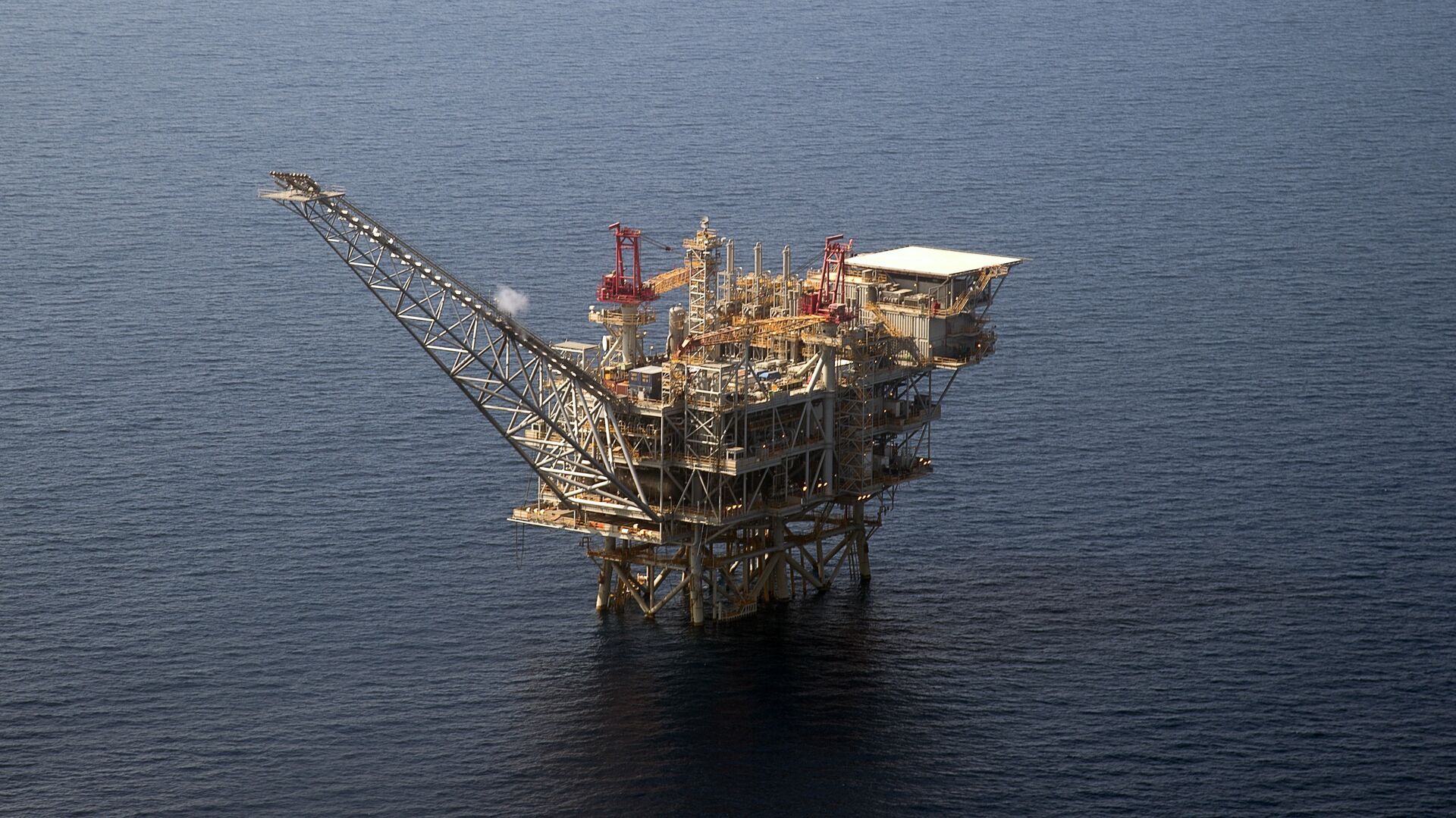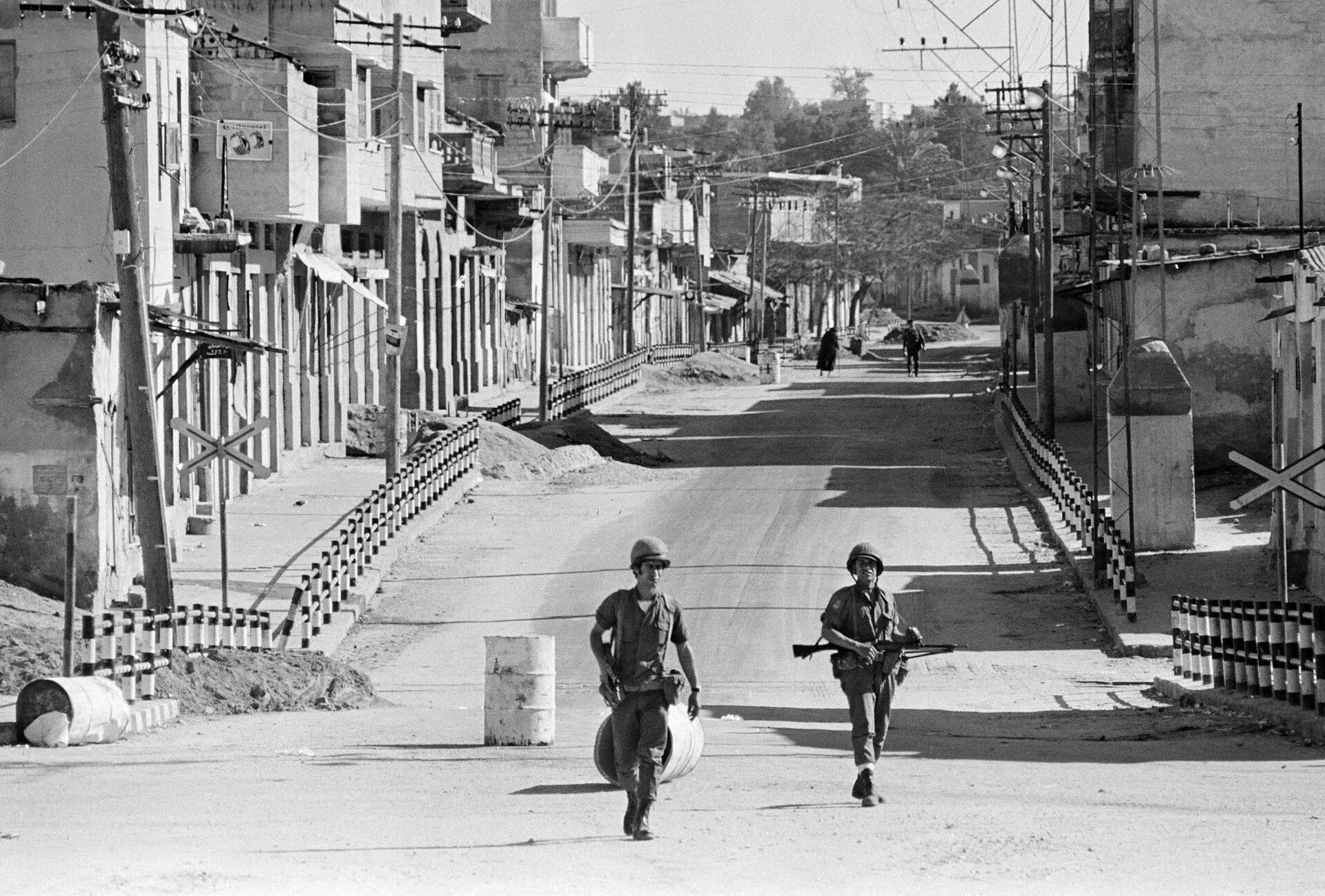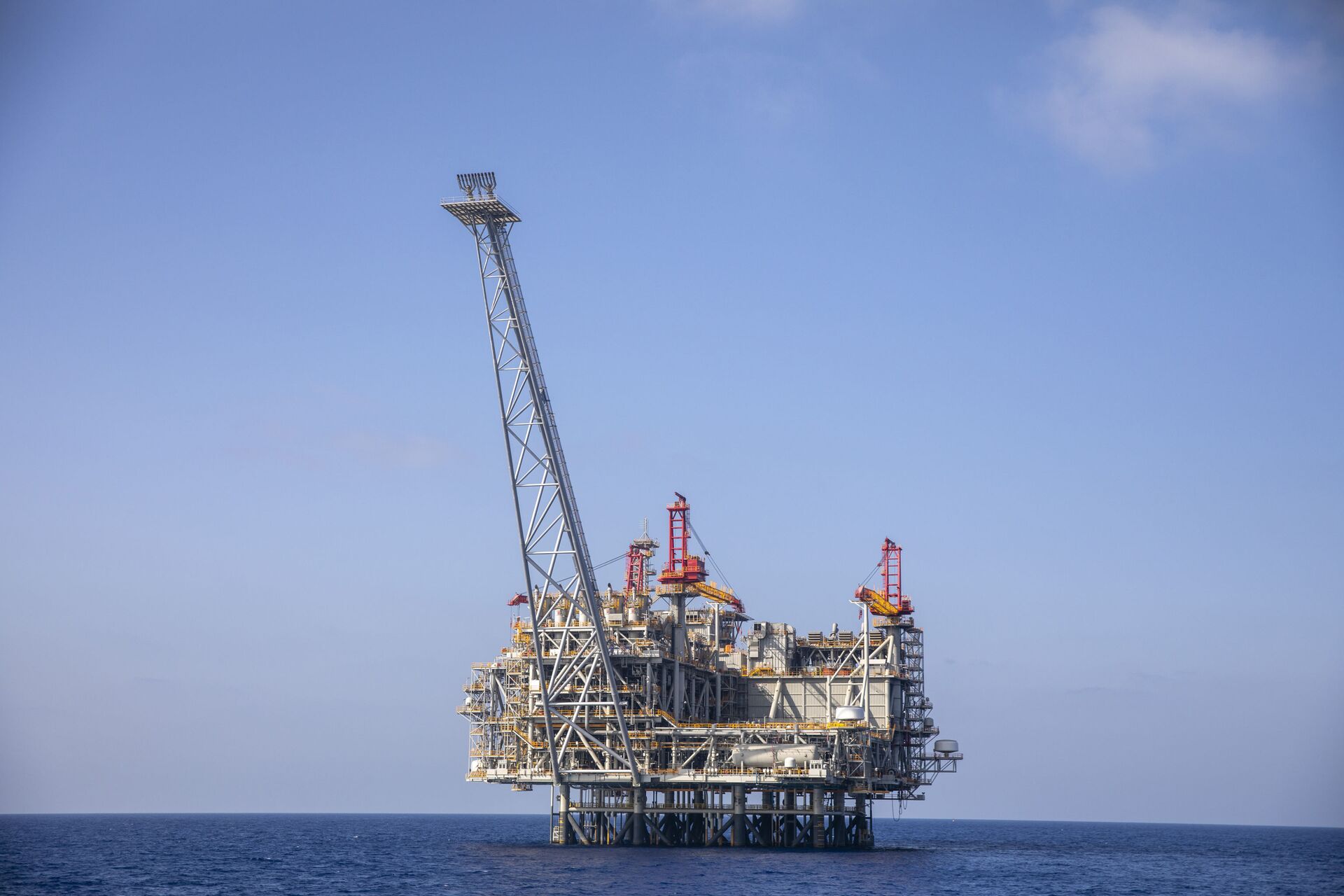https://sputnikglobe.com/20231119/does-israel-export-oil-and-gas-1115058295.html
Does Israel Export Oil and Gas?
Does Israel Export Oil and Gas?
Sputnik International
The unfolding Gaza war has prompted fears of a potential disruption of energy commodity delivery to the global market. How could the conflict derail the trade?
2023-11-19T17:39+0000
2023-11-19T17:39+0000
2023-11-19T17:39+0000
world
middle east
israel
egypt
tel aviv
israel defense forces (idf)
leviathan
energean
genie energy
recep tayyip erdogan
https://cdn1.img.sputnikglobe.com/img/102581/08/1025810840_0:183:3858:2353_1920x0_80_0_0_62ba7311409b32d31c4a8880392f3492.jpg
Israel used to be a net importer of fossil fuels some decades ago. However, discoveries of oil and gas in the hydrocarbon-rich region have made the Jewish state largely self-sufficient. Recently, Israel has become an exporter of natural gas, which helped it strengthen ties with neighboring Muslim states prior to the bloodbath in Gaza.Why Does Israel Still Import Crude and Could That Change?In September 1955, oil was discovered in Heletz, a moshav (a cooperative association of Israeli smallholders) founded in 1950 in the middle of a triangle formed by Ashkelon, Kiryat Gan and Sderot near the Gaza Strip. Exploratory work kicked off in 1947 with 33 wells having been drilled by the end of 1957 and oil extraction beginning in 1960. The field contained an estimated 94.4 million barrels of crude.In addition, Israel sits on a Meged oil field – located near the towns of Kfar Saba and Rosh Ha'Ayin – that was first discovered in the 1980s. The site's proven oil reserves amount to about 1,525 million barrels, and extraction started in 2010. However, being located close to the border between Israel and the West Bank, the Meged oil field remains subject to an ownership rights dispute.In 1967, Israel capitalized on its victory in the Six-Day War and started to exploit the Sinai oil fields captured from Egypt at the time. During Israel's 12-year-long occupation of Sinai, the Jewish state discovered and developed the offshore Alma oil field. Production began in the spring of 1978, reaching an average daily output of 32,000 barrels (at times going as high as 40,000 barrels per day). According to some estimates, the continued development of the field would make Israel self-sufficient in energy by 1990. However, Tel Aviv sacrificed this oil treasure for a peace agreement with Egypt in March 1979.Another gain of the June 1967 Six-Day War was the Golan Heights, seized by Israel from Syria. In 2015, oil was discovered in the occupied land which Israeli lawmakers voted to annex in 1981. Afek Oil and Gas, a subsidiary of the American company Genie Energy, announced in October 2015 that the Golan Heights potentially contain billions of barrels of oil, which would be enough to satiate Israel's 210,000- barrel-per-day consumption for decades to come. However, Tel Aviv's plans to extract oil in the occupied Golan territories were met with fierce international criticism. Some observers suggested that US President Donald Trump's decision to recognize the Golan Heights as Israeli territory in 2019 was largely triggered by the 2015 oil discovery.Fully-fledged extraction at Karish started in October 2022 with an initial production capacity of 6.5 billion cubic meters of gas a year in 4-6 months, as per S&P Global. According to some estimates, the field's recoverable reserves amount to 1.4 trillion cubic feet (39.6 billion cubic meters) of gas and 61 million barrels of liquids.Meanwhile, it is believed that Israel may have large reserves of shale oil which is allegedly concentrated in the Shefela basin (estimated reserves at 34 billion tons), located southwest of Jerusalem, as well as in the north of the Negev Desert (Rotem-Yamin, Mishash and Ghareb structures). Geological exploration in the Shefela Basin was conducted by Israel Energy Initiatives, a subsidiary of American company Genie Energy.How Israeli Offshore Gas Fields Created Export OpportunitiesWhile Israel could hardly be called an oil-rich country, it still can boast its natural gas deposits. Between 2005 and 2012, Israel had imported gas from Egypt, but these supplies had been repeatedly interrupted over sabotage attacks and, in 2011, because of the Arab Spring events. Under these conditions, Israel needed domestic sources of the commodity.Natural gas was first found offshore Israel in the so-called Noa field in the Mediterranean in 1999. However, it was decided at the time that the deposit was too small for commercial use. Still, the next year, the Mari-B field was discovered nearby and has begun supplying gas to Israeli power plants since 2004.In 2009, US company Noble Energy and its Israeli partners started exploration works at the Tamar offshore field which is believed to hold around 315 billion cubic meters (bcm) of natural gas. In April 2013, Israel kicked off fuel production to meet domestic energy needs.Then, Tanin and Karish fields were found in 2012 and 2013, respectively, in the Levantine Basin of the Mediterranean Sea. Their combined reserves are estimated at 75 bcm of natural gas. The search for new gas deposits has not stopped since then: to date, Israel has discovered 11 gas fields.As per a report prepared by accounting company BDO Global in June 2023 for the Israeli Natural Gas Trade Association, Israel's natural gas reserves have grown by 40% from 780 bcm in 2012 to 1,087 bcm at the end of 2022 due to extensive drilling and exploration activities.In January 2017, Israel started to sell the fuel abroad. Its first customer was Jordan. Jordanian firms Arab Potash and Jordan Bromine inked a deal with Israel in 2014 to receive gas from the Tamar field. The Israeli press noted that the deal was shrouded in secrecy since it was unpopular with the population of the MidEast kingdom, almost half of whom are of Palestinian origin. Even though Jordan signed a peace deal with Israel in 1994, protests were expected. To calm the public down, Jordanian Information Minister Mohamed Momani told state television that the energy agreement with Israel would slash $600 million a year from the state's energy bill.Three years later, Israel started gas exports to Egypt – another country it had a peace treaty with – from the Leviathan field in January 2020. However, per Israeli scholars, the nation's gas bonanza created opportunities to sell the commodity elsewhere, including Europe and Asia.Israel to Capitalize on EU Gas Market Amid Anti-Russia SanctionsTo expand the geography of its gas supplies, Israel and Egypt agreed to use the North African country's two liquefied natural gas (LNG) plants to chill and liquefy the Jewish state's fuel. In mid-June 2022, the EU, Egypt and Israel signed a memorandum of understanding (MOU) to export Israeli LNG to Europe.The deal came at the time when Europe moved to sever energy ties with Russia over the latter's special military operation in Ukraine, which started on February 24, 2022. Following Washington's suit, Europe started phasing out the consumption of Russia's cheap pipeline gas, trying to at least partially supplement it by chilled fuel from various suppliers, including the US and Middle Eastern and African gas producers.To that end, the Jewish state stepped up its gas supplies to Egypt. In August, Israeli Energy Minister Israel Katz said that Israel was seeking to increase exports to Egypt by an additional 38.7 bcm over the next 11 years.To explore the European market, Israel has been considering a number of options: one of them was a US-backed EastMed project to carry Egyptian and Israeli gas to Europe through an offshore pipeline bypassing Turkiye. However, in April 2022, Biden administration officials signaled that the EastMed "was not viable" citing cost-related issues.Another option considered by Tel Aviv envisaged building a gas pipeline to Turkiye and then directing the fuel to Europe. Ankara expressed interest in the project with Turkish Energy Minister Alparslan Bayraktar telling the press on October 5: "Carrying the gas to Europe via Turkiye is solely a part of the scope. Essential is Israeli gas coming to Turkiye." However, the obstacle in the path of the project was strained relations between Turkiye and Cyprus, the island which has remained divided since the Turkish invasion of 1974. A potential offshore pipeline had to pass through Cyprus' water zone and required a settlement of territorial disputes between Turkiye, Turkish and Greek Cypriots.The third option, advocated by the Cypriot government, envisioned building a pipeline that would carry Israeli and Cypriot offshore gas (including that from the mutually contested Aphrodite deposit) to the east Mediterranean island nation where it would be liquefied and then sold to Europe or elsewhere.How Gaza War Affects Israel Energy Export-ImportThe fierce Gaza war prompted Israel to suspend production at the Tamar field – located within the range of rocket firing from the Gaza Strip – for five weeks, backfiring on the nation's gas revenues. Yet another casualty of the Palestine-Israel conflict was Tel Aviv's pipeline project with Turkiye after Ankara signaled its full support to the Palestinian cause.Last month, Turkish President Recep Tayyip Erdogan told a pro-Palestinian rally that he planned to accuse Israel of committing war crimes, as civilian casualties in the Gaza Strip skyrocketed amid Israel Defense Forces (IDF) retaliation against Hamas. In the wake of Erdogan's statement, the Israeli government signaled that it would reassess diplomatic relations with Ankara.Speaking to AP on November 7, Cypriot Energy Minister George Papanastasiou suggested that the Israeli-Turkish row over Gaza could narrow Tel Aviv's gas trade options to building the proposed short offshore pipeline to Cyprus for processing and shipping to foreign markets. The Israeli-Hamas conflict "has changed the situation somewhat, and that’s where Cyprus has to take advantage of this emerging window of opportunity," Papanastasiou said.Meanwhile, Jordan recalled its ambassador to Israel in early November, accusing Tel Aviv of creating an "unprecedented humanitarian catastrophe". The Arab country also signaled that it won't sign a deal to provide electricity to Israel in exchange for water. It was planned that the agreement would be ratified last month.To date, 10 countries from across the world have withdrawn diplomats from Israel over its ground operation in the Gaza Strip.Some observers suggested that the war could backfire on Israel's capabilities to import crude given that 60% of it comes from two majority Muslim nations – Kazakhstan and Azerbaijan, per Bloomberg. The media noted that Iran urged Muslim countries to impose an oil embargo on Tel Aviv.
https://sputnikglobe.com/20151028/golan-heights-oil-syrian-conflict-engdahl-1029209074.html
https://sputnikglobe.com/20231117/gaza-marine-is-israel-palestine-conflict-caused-by-offshore-gas-interests-1115031157.html
https://sputnikglobe.com/20231005/eu-to-face-gas-scarcity-as-energy-market-heads-for-period-of-turmoil-says-gazprom-1113953249.html
https://sputnikglobe.com/20200911/turkey-slams-southern-eu-states-declaration-supporting-greece-amid-eastmed-tensions-1080432351.html
https://sputnikglobe.com/20231029/turkiye-to-declare-israel-war-criminal-to-world-over-gaza---erdogan-1114569008.html
https://sputnikglobe.com/20231119/russian-iranian-foreign-ministers-call-for-ceasefire-in-gaza-strip-1115058127.html
israel
egypt
tel aviv
Sputnik International
feedback@sputniknews.com
+74956456601
MIA „Rosiya Segodnya“
2023
News
en_EN
Sputnik International
feedback@sputniknews.com
+74956456601
MIA „Rosiya Segodnya“
Sputnik International
feedback@sputniknews.com
+74956456601
MIA „Rosiya Segodnya“
israel, gaza, israel-hamas war, israel-palestine conflict, gaza strip, israel oil. israel natural gas, israel offshore drilling, eastmed project, israel-cypriot pipeline, israel egypt lng plants, is israel selling gas to europe, anti-russia sanctions, anti-russia energy embargo, tamar, leviathan, karish, natural gas, shale oil, gas exploration, drilling, oil wells
israel, gaza, israel-hamas war, israel-palestine conflict, gaza strip, israel oil. israel natural gas, israel offshore drilling, eastmed project, israel-cypriot pipeline, israel egypt lng plants, is israel selling gas to europe, anti-russia sanctions, anti-russia energy embargo, tamar, leviathan, karish, natural gas, shale oil, gas exploration, drilling, oil wells
Israel used to be a net importer of fossil fuels some decades ago. However, discoveries of oil and gas in the hydrocarbon-rich region have made the Jewish state largely self-sufficient.
Recently, Israel has become an exporter of natural gas, which helped it strengthen ties with neighboring Muslim states prior to the bloodbath in Gaza.
Why Does Israel Still Import Crude and Could That Change?
In September 1955, oil was discovered in Heletz, a moshav (a cooperative association of Israeli smallholders) founded in 1950 in the middle of a triangle formed by Ashkelon, Kiryat Gan and Sderot near the Gaza Strip. Exploratory work kicked off in 1947 with 33 wells having been drilled by the end of 1957 and oil extraction beginning in 1960. The field contained an estimated 94.4 million barrels of crude.
In addition, Israel sits on a Meged oil field – located near the towns of Kfar Saba and Rosh Ha'Ayin – that was first discovered in the 1980s. The site's proven oil reserves amount to about 1,525 million barrels, and extraction started in 2010. However, being located close to the border between Israel and the West Bank, the Meged oil field remains subject to an ownership rights dispute.
In 1967, Israel capitalized on its victory in the Six-Day War and started to exploit the Sinai oil fields captured from Egypt at the time.
During Israel's 12-year-long occupation of Sinai, the Jewish state discovered and developed the offshore Alma oil field. Production began in the spring of 1978, reaching an average daily output of 32,000 barrels (at times going as high as 40,000 barrels per day). According to some estimates, the continued development of the field would make Israel self-sufficient in energy by 1990. However, Tel Aviv sacrificed this oil treasure for a peace agreement with Egypt in March 1979.
As part of the 1979 agreement, Egypt started to supply oil to Israel. That was crucial for the Jewish state given that its former partner, Iran, stopped supplying crude to Tel Aviv after the Islamic Revolution (January 1978 – February 1979). Prior to that, Tehran and Tel Aviv maintained close relations from 1953 to 1979 under the Pahlavi dynasty with the Israelis considering Iranians – non-Arabs – as natural allies at the time.
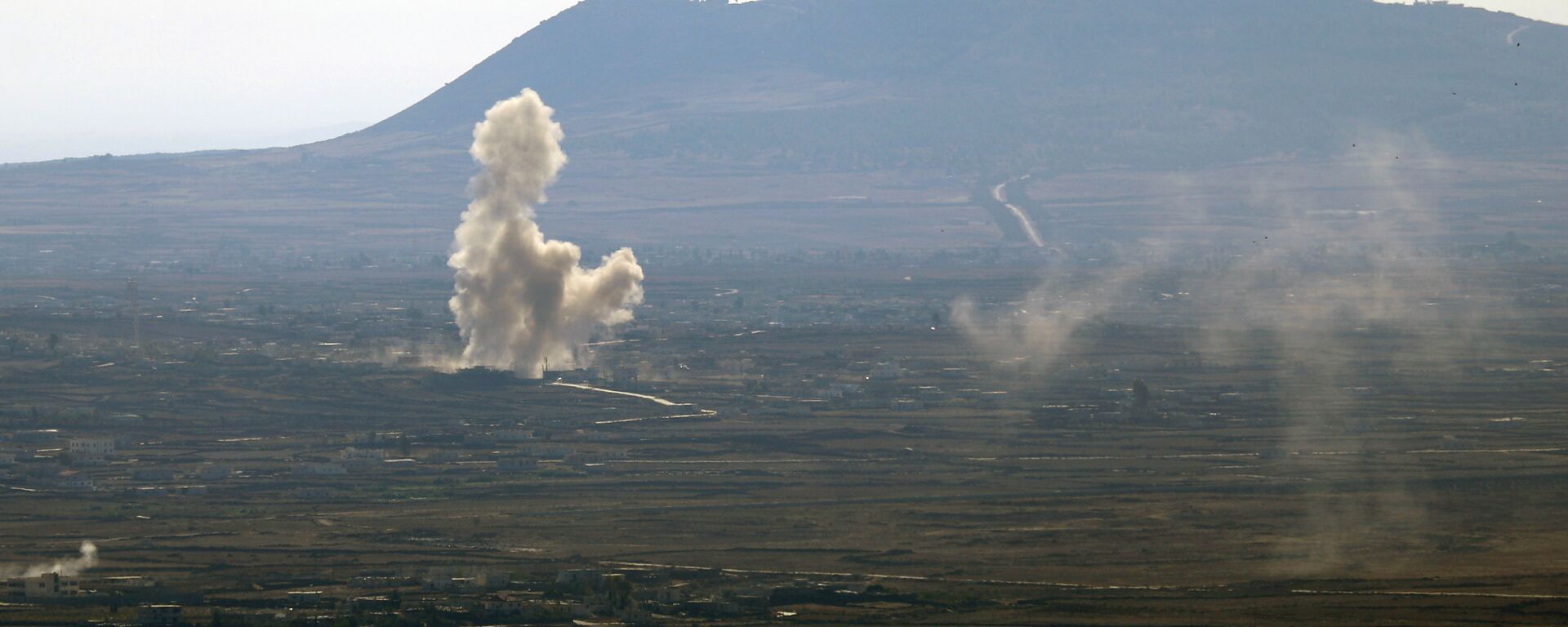
28 October 2015, 05:50 GMT
Another gain of the June 1967 Six-Day War was the Golan Heights, seized by Israel from Syria. In 2015, oil was discovered in the occupied land which Israeli lawmakers voted to annex in 1981. Afek Oil and Gas, a subsidiary of the American company Genie Energy, announced in October 2015 that the Golan Heights potentially contain billions of barrels of oil, which would be enough to satiate Israel's 210,000- barrel-per-day consumption for decades to come. However, Tel Aviv's plans to extract oil in the occupied Golan territories were met with fierce international criticism. Some observers suggested that US President Donald Trump's decision to recognize the Golan Heights as Israeli territory in 2019 was largely triggered by the 2015 oil discovery.
Even though Israel still largely remains an oil importer – receiving about 220,000 barrels a day of the commodity from its suppliers – the Jewish state began its first-ever crude oil exports in February 2023 from the mainly gas-producing Karish offshore field. The UK-based company Energean announced Israel's admission to the "exporters" club on February 14. The cargo was sold as part of a marketing agreement with Vitol, an energy and commodities company, and sent to Europe.
Fully-fledged extraction at Karish started in October 2022 with an initial production capacity of 6.5 billion cubic meters of gas a year in 4-6 months, as per S&P Global. According to some estimates, the field's recoverable reserves amount to 1.4 trillion cubic feet (39.6 billion cubic meters) of gas and 61 million barrels of liquids.
Meanwhile, it is believed that Israel may have large reserves of shale oil which is allegedly concentrated in the Shefela basin (estimated reserves at 34 billion tons), located southwest of Jerusalem, as well as in the north of the Negev Desert (Rotem-Yamin, Mishash and Ghareb structures). Geological exploration in the Shefela Basin was conducted by Israel Energy Initiatives, a subsidiary of American company Genie Energy.
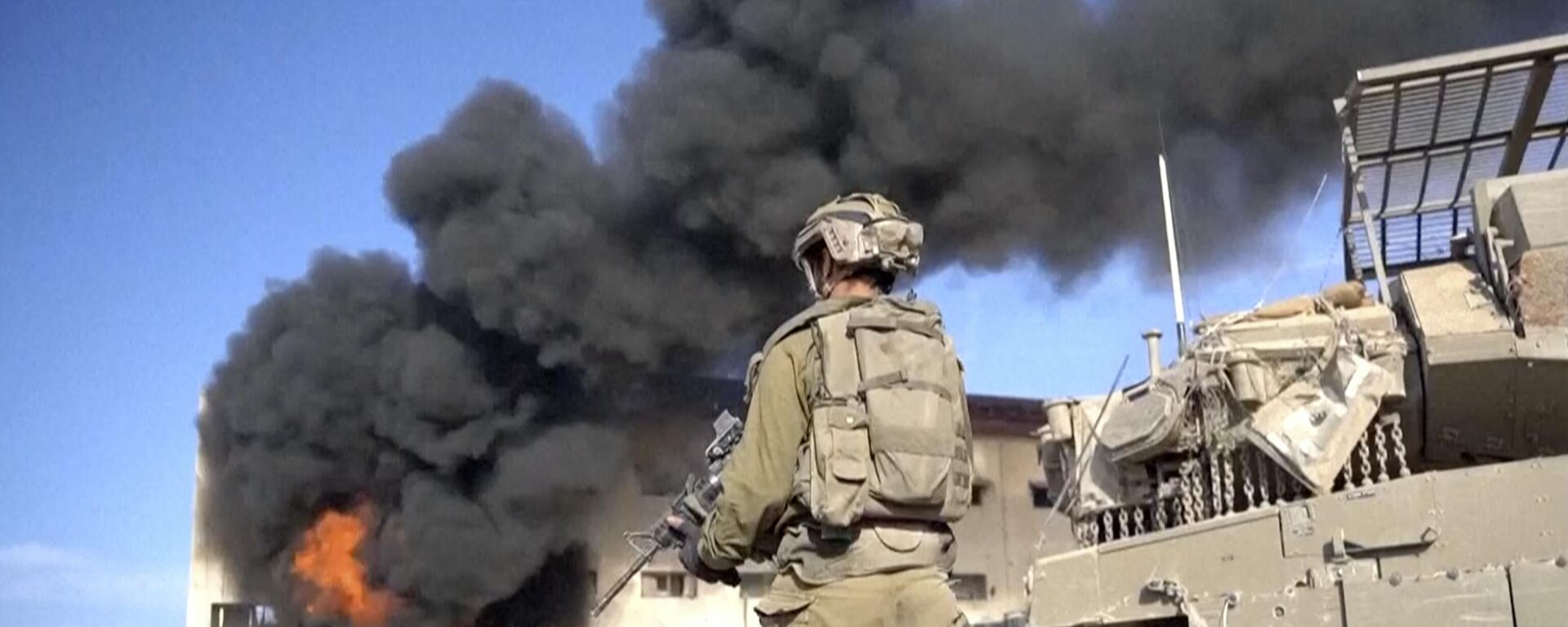
17 November 2023, 19:33 GMT
How Israeli Offshore Gas Fields Created Export Opportunities
While Israel could hardly be called an oil-rich country, it still can boast
its natural gas deposits. Between 2005 and 2012, Israel had imported gas from Egypt, but these supplies had been repeatedly interrupted over sabotage attacks and, in 2011, because of the Arab Spring events. Under these conditions, Israel needed domestic sources of the commodity.
Natural gas was first found offshore Israel in the so-called Noa field in the Mediterranean in 1999. However, it was decided at the time that the deposit was too small for commercial use. Still, the next year, the Mari-B field was discovered nearby and has begun supplying gas to Israeli power plants since 2004.
In 2009, US company Noble Energy and its Israeli partners started exploration works at the Tamar offshore field which is believed to hold around 315 billion cubic meters (bcm) of natural gas. In April 2013, Israel kicked off fuel production to meet domestic energy needs.
Meanwhile, the discovery of the Leviathan gas field 47 kilometers (29 miles) southwest of Tamar in 2010 was nothing short of a breakthrough. It is estimated that Leviathan contains 605 bcm of natural gas which is almost two-thirds of all gas discovered to date offshore Israel. The new field went into production in late 2019 and by 2021 surpassed Tamar providing over 50% of Israel's natural gas.
Then, Tanin and Karish fields were found in 2012 and 2013, respectively, in the Levantine Basin of the Mediterranean Sea. Their combined reserves are estimated at 75 bcm of natural gas. The search for new gas deposits has not stopped since then: to date, Israel has discovered 11 gas fields.
As per a report prepared by accounting company BDO Global in June 2023 for the Israeli Natural Gas Trade Association, Israel's natural gas reserves have grown by 40% from 780 bcm in 2012 to 1,087 bcm at the end of 2022 due to extensive drilling and exploration activities.
In January 2017, Israel started to sell the fuel abroad. Its first customer was Jordan. Jordanian firms Arab Potash and Jordan Bromine inked a deal with Israel in 2014 to receive gas from the Tamar field. The Israeli press noted that the deal was shrouded in secrecy since it was unpopular with the population of the MidEast kingdom, almost half of whom are of Palestinian origin. Even though Jordan signed a peace deal with Israel in 1994, protests were expected. To calm the public down, Jordanian Information Minister Mohamed Momani told state television that the energy agreement with Israel would slash $600 million a year from the state's energy bill.
Three years later, Israel started gas exports to Egypt – another country it had a peace treaty with – from the Leviathan field in January 2020. However, per Israeli scholars, the nation's gas bonanza created opportunities to sell the commodity elsewhere, including Europe and Asia.
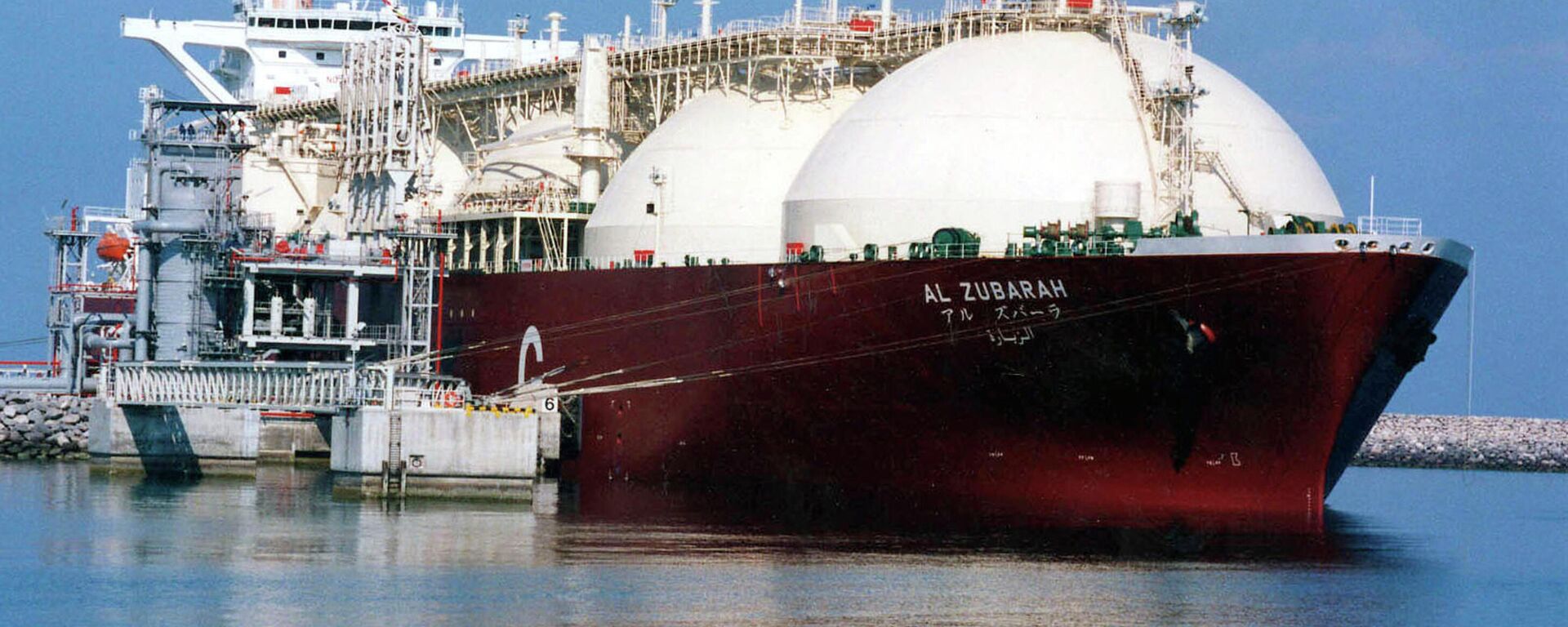
5 October 2023, 14:00 GMT
Israel to Capitalize on EU Gas Market Amid Anti-Russia Sanctions
To expand the geography of its gas supplies, Israel and Egypt agreed to use the North African country's two liquefied natural gas (LNG) plants to chill and liquefy the Jewish state's fuel. In mid-June 2022, the EU, Egypt and Israel signed a memorandum of understanding (MOU) to export Israeli LNG to Europe.
The deal came at the time when Europe moved to sever energy ties with Russia over the latter's special military operation in Ukraine, which started on February 24, 2022. Following Washington's suit, Europe started phasing out the consumption of Russia's cheap pipeline gas, trying to at least partially supplement it by chilled fuel from various suppliers, including the US and Middle Eastern and African gas producers.
To that end, the Jewish state stepped up its gas supplies to Egypt. In August, Israeli Energy Minister Israel Katz said that Israel was seeking to increase exports to Egypt by an additional 38.7 bcm over the next 11 years.
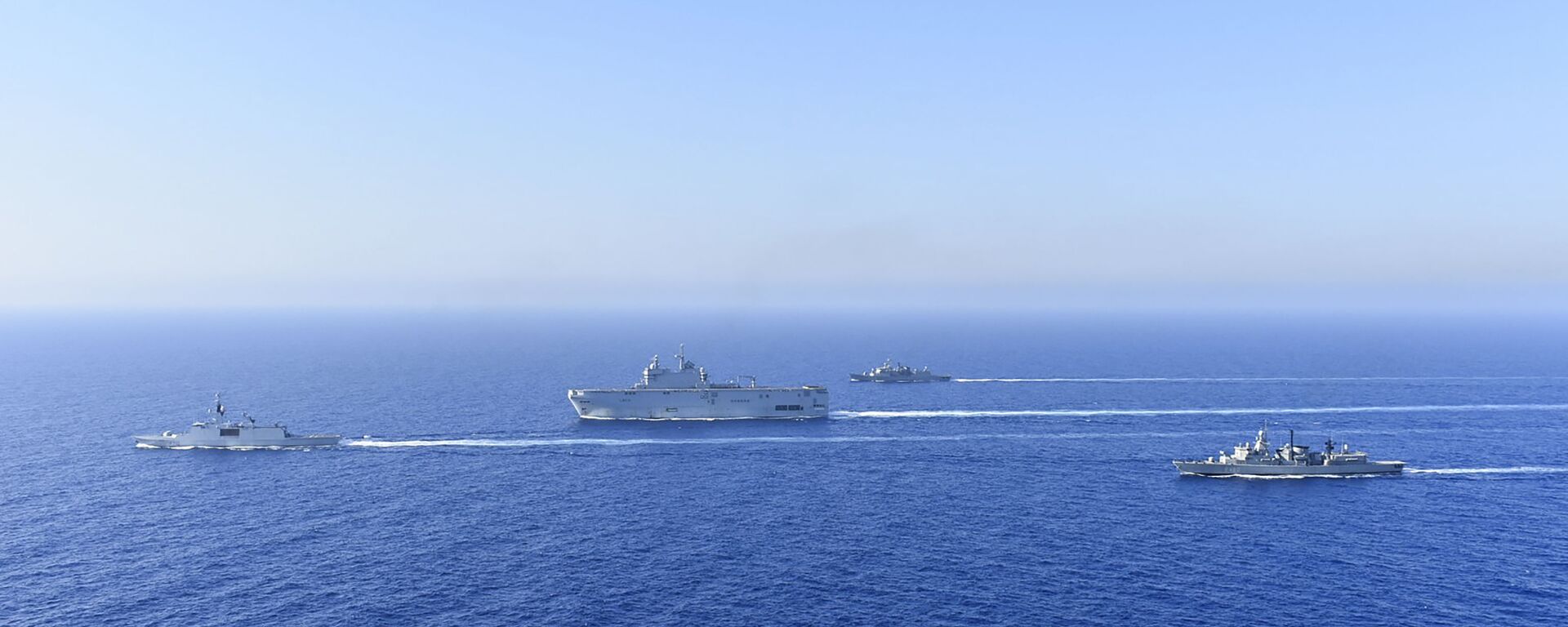
11 September 2020, 14:20 GMT
To explore the European market, Israel has been considering a number of options: one of them was a US-backed EastMed project to carry Egyptian and Israeli gas to Europe through an offshore pipeline bypassing Turkiye. However, in April 2022, Biden administration officials signaled that the EastMed "was not viable" citing cost-related issues.
Another option considered by Tel Aviv envisaged building a gas pipeline to Turkiye and then directing the fuel to Europe. Ankara expressed interest in the project with Turkish Energy Minister Alparslan Bayraktar telling the press on October 5: "Carrying the gas to Europe via Turkiye is solely a part of the scope. Essential is Israeli gas coming to Turkiye." However, the obstacle in the path of the project was strained relations between Turkiye and Cyprus, the island which has remained divided since the Turkish invasion of 1974. A potential offshore pipeline had to pass through Cyprus' water zone and required a settlement of territorial disputes between Turkiye, Turkish and Greek Cypriots.
The third option, advocated by the Cypriot government, envisioned building a pipeline that would carry Israeli and Cypriot offshore gas (including that from the mutually contested Aphrodite deposit) to the east Mediterranean island nation where it would be liquefied and then sold to Europe or elsewhere.
How Gaza War Affects Israel Energy Export-Import
The fierce Gaza war prompted Israel to suspend production at the Tamar field – located within the range of rocket firing from the Gaza Strip – for five weeks, backfiring on the nation's gas revenues. Yet another casualty of
the Palestine-Israel conflict was Tel Aviv's pipeline project with Turkiye after Ankara signaled its full support to the Palestinian cause.
Last month, Turkish President Recep Tayyip Erdogan told a pro-Palestinian rally that he planned to accuse Israel of committing war crimes, as civilian casualties in the Gaza Strip skyrocketed amid Israel Defense Forces (IDF) retaliation against Hamas. In the wake of Erdogan's statement, the Israeli government signaled that it would reassess diplomatic relations with Ankara.
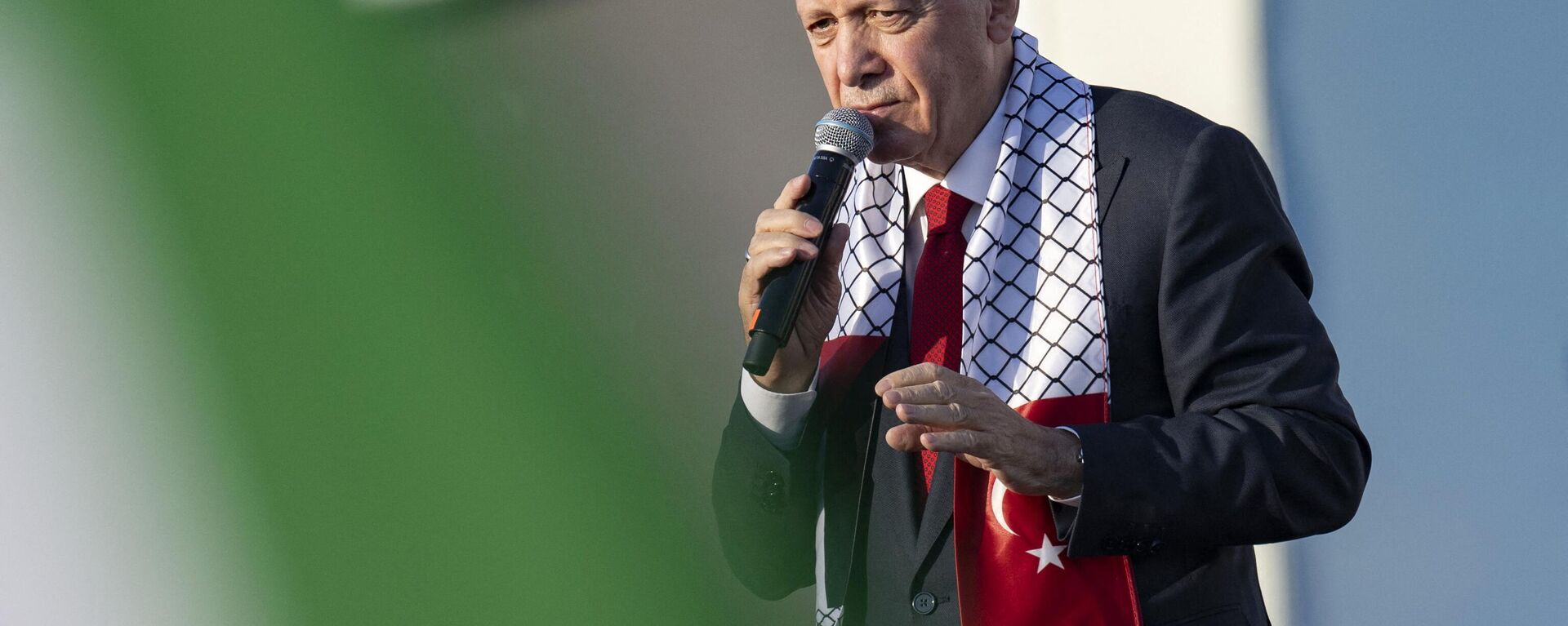
29 October 2023, 09:05 GMT
Speaking to AP on November 7, Cypriot Energy Minister George Papanastasiou suggested that the Israeli-Turkish row over Gaza could narrow Tel Aviv's gas trade options to building the proposed short offshore pipeline to Cyprus for processing and shipping to foreign markets. The Israeli-Hamas conflict "has changed the situation somewhat, and that’s where Cyprus has to take advantage of this emerging window of opportunity," Papanastasiou said.
Meanwhile, Jordan recalled its ambassador to Israel in early November, accusing Tel Aviv of creating an "unprecedented humanitarian catastrophe". The Arab country also signaled that it won't sign a deal to provide electricity to Israel in exchange for water. It was planned that the agreement would be ratified last month.
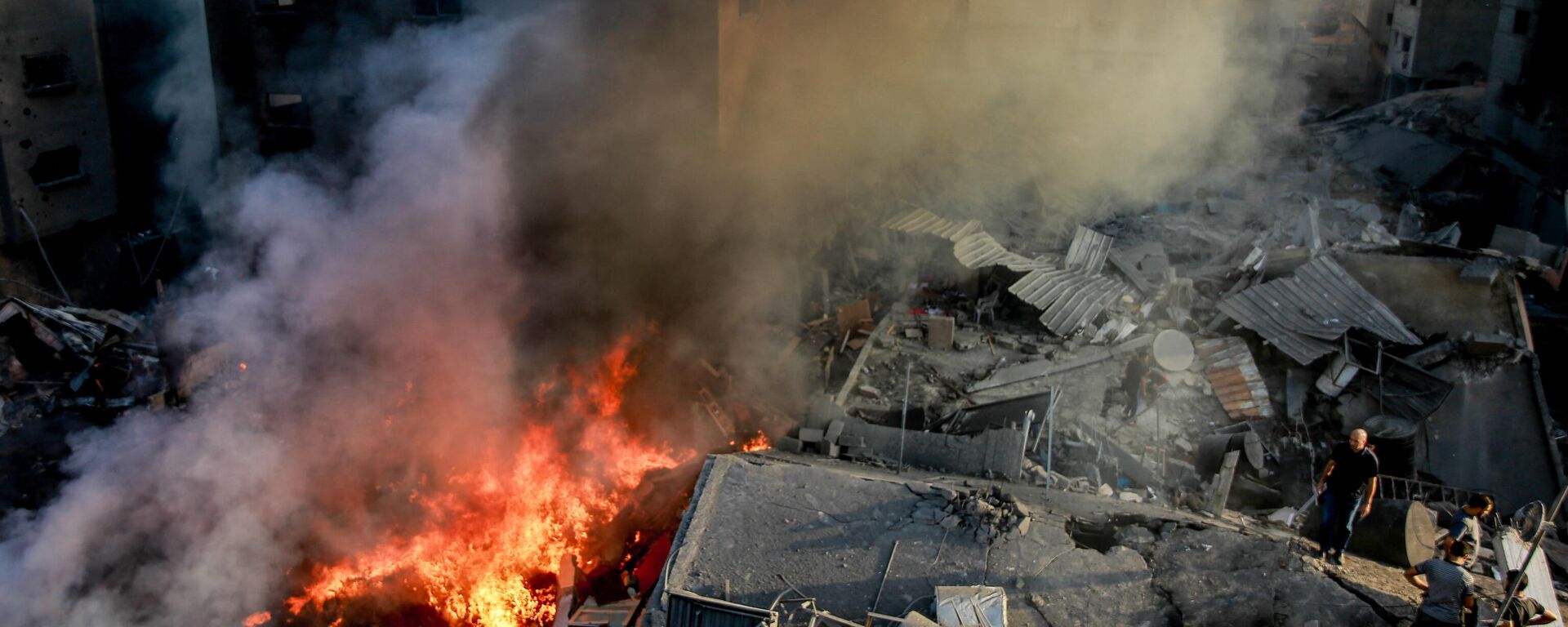
19 November 2023, 16:22 GMT
To date, 10 countries from across the world have withdrawn diplomats from Israel over its ground operation in the Gaza Strip.
Some observers suggested that
the war could backfire on Israel's capabilities to import crude given that 60% of it comes from two majority Muslim nations – Kazakhstan and Azerbaijan, per Bloomberg. The media noted that Iran urged Muslim countries to impose an oil embargo on Tel Aviv.
As of yet, Israel has managed to overcome energy constraints while oil and gas costs have not been sent too high by the Gaza crisis. Nonetheless, the World Bank has warned that energy prices could be pushed into "uncharted waters" if the Palestinian-Israeli war spills over into neighboring regions.
